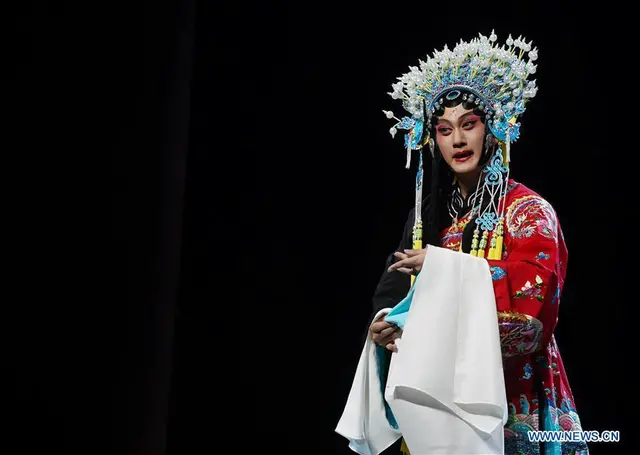Situated on the crossroads of Pingan Avenue and the second ring road in Beijing, Meilanfang Theatre is a medium-sized theatre which combines Chinese and western architectural styles.
Here audiences can enjoy the famous Peking Opera, as well as dramas, pantomime and concerts.
Perhaps less well-known than the Peking Opera is the Kunqu, an opera which combines elements of northern and southern operatic styles. The Kunqu is gentle and sentimental so it is often called shuimodiao or water-polished music.
My first impression of Kunqu was the soft tone of the actors voices, the high-pitched singing of even the male actors as well as the tremulous and delicate movements of the actors' hands.
The tale of the jade hairpin is a love tale which focuses on romance between a young scholar and a girl who has taken refuge as a nun.
The language is old-fashioned and the pink and blue silk costumes seem to come from another world. The mood is overly romantic as the male performer pines and sighs for the female lead, chasing her from one end of the stage to the other.
Nonetheless, there is a delicate charm in the unfolding of the love story and audiences cannot help admire the skill and poise of the actors as they perform.
Performances are long, often lasting for three hours.
The clown or xiaochou is a very entertaining part of Kunqu.
Pulling faces at the audience, performing acrobatics, while telling jokes in a Suzhou accent, the visual humour of the clown provides entertainment away from the dialogue of the main story.
In one sketch, the clown pilfers a man's food and the man chases the xiaochou about the stage. The two performers display impressive athleticism as one man tries to catch the other. The xiaochou also performed multiple handstands, to the loud applause of the audience.
A dream of Nanke staged in April.
The story follows Chun Yufen, a man who, after drinking too much, falls into a dream where he becomes mayor of Nanke, then marrying the King's daughter.
Later, his friends discover an anthill in the tree trunk where he fell asleep. They work out that the kingdom where he lived was actually the anthill, a metaphor for the comparative scale of a human life.
While the slow-paced poetic dialogue of Kunqu may not be for everyone, it has a gentle charm which exudes the emotion of Chinese culture.
 简体中文
简体中文







